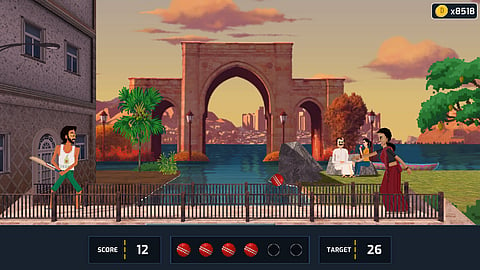Cues on Indian lanes
At some point in ‘Detective Dotson’, Dotson encounters a narrative dead-end in the mystery he is trying to solve. He is trying to find out why a girl in a red sari tried to jump into a well. The one person who can help him with the answers is Mrs Sharma. She can always be found at the town’s ladies club. But how can Dotson, a man, get into the ladies club which has a hounding security guard? He does this by employing one of his only skills — the art of disguise — something he probably picked up from his days of trying to make it in Bollywood. He dresses up as a woman, fools the guard, and enters the ladies club. The women there love to gossip, and all the answers he ever needed are handed over to him on a platter. For some reason, this particular mystery stuck with me. Something about it just rubbed me the wrong way and I can’t put my finger on what exactly that was. Was it that, as a person who loves a good puzzle, I felt undercut by how easily the mystery was solved? That all I had to do was to enter the ladies club and have the answers just given to me?
There are many such moments in Detective Dotson, a point-and-click mystery game about Dotson, who becomes an unwilling detective when he must solve the murkiness surrounding his father’s death. The game currently has three mini-mysteries that lead into a bigger one. In a mystery that involves getting a confession about a crime, Dotson dresses up as a godman, and the required people leak their deepest darkest secrets — including the confession itself. What all these interactions lead to are “clues”, which are placed haphazardly on giant boards. Our goal is to link these clues in the proper order to solve it all. The problem is that the wordings can get confusing, that at times knowing the answers wasn’t enough. I found an easy fix. Cleaning up the streets by throwing garbage into bins gave me free hints. These hints would simply auto-correct my wrongly placed clues. All this is to say that I didn’t really experience the satisfaction of solving the entire mystery myself.
There is a roundabout way in which Dotson finds the various attires he sometimes uses to interact with people. These “object hunt” tasks take longer than the actual crime-solving, and are essentially the primary mechanic of this game. We must find objects within a city — they could be hidden in the environment, or bought in shops. Some objects are of interest to certain people, who will give you information on trade. Getting the godman attire required a trade that involved finding the right shops that peddled paan, dosa, or puja items, which in
itself requires some exploration around the streets.
The whole game has a very cute pixel art style, and recreates the maximalism and loudness of Indian streets. There are several enjoyable mini-games as well. There’s a bollywood-rhythm themed recreation of Guitar Hero, a bargaining game thrown into all the shops in the city, and several missing-object games which were a huge throwback to games I played as a child. I loved the constant undercurrent of the lovely music in the game. In fact, there is also a recommended background watch movie made for the game. I didn’t watch it, but maybe you can if you’re interested — on a quick look, it also seems to have the heavy bollywood-masala vibe that this game adopts.
This brings me back to the puzzle I first mentioned in the article. I do think there are better ways to represent Indian culture in a puzzle game without embodying “comedy” from a masala movie and adopting its silly tropes — especially if the game does not have the space to confront the larger issues surrounding it. For instance, I can think of plenty of different ways in which Dotson could have got the clue that solved that particular mystery, which did not involve him entering a women-only space by dressing up as a woman. I think we sometimes get ahead of ourselves and assume that a game’s graphics, music, and funny quotable quotes are critical, and can more than compensate for average writing. Writing is especially important, considering that this is a detective game where the entire jig is collecting clues through conversations, and stitching them together on a murder board to solve a mystery.
Don’t get me wrong — I’ve long since waited for a home-grown development studio, the likes of Masala Games to create a non-combat focused game. And I give huge credit to the development team for coming out with a game like Detective
Dotson. I also know that a new chapter is set to release soon, and I’m really looking forward to an even better challenge! I received a reviewers copy of the game for the PC. The game is expected to release for the
Xbox, and will also have a couch-co op mode along with it later this year.

